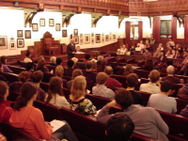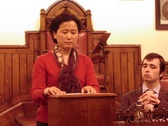In the dark oak and leather-clad debating chamber of the oldest debating society in the world a forum on Human Rights in China rang clear.
 |
 |  |
| David Kilgour | David Matas |
 |  |
| Annie Yang |
Beijing Olympics
Kilgour addressed the urgent issue of human rights abuses and the Beijing Olympics, saying “Virtually all independent observers agree that repression across China is increasing as the Beijing Olympics and Paralympics approach. Hosting an Olympiad while escalating the persecution of communities and individuals among your own population is irreconcilable with the modern Olympic Charter.”
With Beijing displacing thousands of its citizens and arrests on the rise, all for the sake of improving their own international image for the Olympics, Kilgour likened this behaviour to the Third Reich and the 1936 Berlin Olympics where the Nuremberg Laws of September 1935 removed all civil liberties from German Jews and political executions without trial were all too frequent.
Kilgour stated that in China, the number of arrests nearly doubled from 2005 to 2006 (the most recent year for which figures are available).
Among those citizens arrested was Gao Zhisheng. Zhisheng is a lawyer who was nominated (by Westerners) for the Nobel Peace Prize last year for his courageous efforts to speak out on human rights abuses in China, despite the attempt on his life, his livelihood being taken away and his wife and thirteen year old daughter being attacked by police.
In December 2005 Zhisheng said, “It is our misfortune to live in the China of this historical period.
No one on this earth has ever had to experience or witness the suffering that has befallen us. Yet it is also our fortune to live in the China of this historical period. For we will experience and witness how the greatest people on earth banished this suffering once and for all.”
In December 2006 he was sentenced to prison for “inciting subversion of state power”, which was suspended due to international pressure, however, his whereabouts are currently unknown.
Taking action
With the aggressive silencing of citizens who might shine a clear light on Beijing, Kilgour says “It is simply nonsense for the president of the IOC [International Olympics Committee] to imply that the Olympics have nothing to do with politics; for the party-state in China, it has everything to do with politics and its image in the world.”
“The Olympic Games and human rights movements worldwide share the same goals: unity, dignity and equality among the entire human family. When this is violated systematically by the host government of an Olympiad, the Olympic movement as a whole loses credibility. The IOC has to date provided no substantive response on this issue.
“The IOC should demand from the organisers of the 2008 Games that they conform to the Charter and refrain from discrimination against any group or individual during these Games.”
Kilgour did not just put the onus on the IOC, he also suggested that governments, National Olympic Committees as well as the corporate sponsors of the Olympics should all be stepping forward and putting pressure on China to improve it’s human rights and honour the promises it made when Beijing bid for the games.
As for citizens, he recommended that “we might all begin to ask serious questions to the corporate sponsors of the Games, including Manulife, Visa, Kodak, Samsung, Panasonic, Omega, Johnson & Johnson, McDonald’s, General Electric, John Hancock and Coca-Cola. Silence from them implies acquiescence with what is going on across China.”
Torture in the labour camps
Annie Yang was the second speaker in this forum. She is a middle-aged Chinese woman who was arrested in China in March 2005 because she practices Falun Gong, a spiritual belief from the Buddhist School which was banned by the Chinese regime in July 1999.
The night of her arrest, seven or eight plain-clothed police came to her home and searched every corner. They took her Falun Gong books, her computer, printer and her self. Being a single mother, her sixteen year old son was left alone and frightened, so he called his grandparents for help. Hearing the news, Annie’s father had a heart attack. Luckily Annie’s younger brother was nearby and put a pill in his mouth, so he survived.
Annie was placed in detention and “Forty days later I was taken away without a court order, without a lawyer and I was told I was sentenced to two years.”
“At the labour camp, all they do is force us to renounce our belief.”
In the labour camp, her only food was thirty grams of hard sour bread each meal and a maximum of 500 ml of water despite the 40C heat.
“Because I refused to renounce my belief, I was not allowed to sleep. I was lucky, I have relations outside China and so they allowed me to sleep for two to three hours a day. But for other practitioners of Falun Gong only ten minutes. I saw one practitioner standing in front of a window, facing the window, standing there for seventeen days.”
She was not allowed to wash or change her clothes and said “I couldn’t sleep, because my hair was itching me intolerably”
She was forced to sit on an uneven plastic stool for twenty hours each day. Three drug addicts were ordered to take eight hour shifts watching over her. The rules were that her feet and knees had to be together, her back had to be straight, her hands had to be placed on her knees and she could not close her eyes. If she wanted to move even a little bit, she had to ask permission.
It was so hot, that she experienced after a week of this sitting torture: “all my of my bottom became infected, for other practitioners the flesh on their bottoms began to rot causing a dreadful stench in the cell.”
Because she had previously lived in London, the Chinese National Security department visited her and tried to force her to renounce her belief. She said, “They made a very clear statement saying they want me to be a spy in the UK” and they promised that if she worked for them, she would be released immediately.
But she declined.
While in detention she had blood tests and urine tests many times.
When she was released in September 2006, her whole body was swollen from malnutrition and she had great difficulty in walking.
Because she had a passport she escaped China and sought asylum in the UK.
She appealed to the audience “I am still in contact with practitioners in China and I heard the news: more practitioners were arrested because of the Olympics. So if everybody can give a hand or just write a letter to your government to put pressure on the Chinese government, things will be changed.”
Combating human rights violations
The final speaker was international human rights lawyer, David Matas. Matas focused on how to combat human rights violations in China, saying “I would say the best strategy is to go after the worst violations first. The worst violations are most likely to mobilise people to get common concern to get a wealth of activity going. What are the worst violations? I would say the worst violations are those that are suffered by Falun Gong practitioners.”
“We’ve heard one example of this, but as David Kilgour has pointed out, fully two-thirds of the torture victims in China Falun Gong practitioners are that’s what the United Nations tells us. The United States Department of State Report tells us that about half the people in the labour camps are Falun Gong practitioners, Annie was one of them, but the Loagai Foundation says there is two million people in labour camps that means about one million are Falun Gong practitioners.
“David Kilgour and I did this report about Organ Harvesting of Falun Gong practitioners in China, that Falun Gong practitioners are being killed for their organs. There are only two populations that suffer that violation: Falun Gong practitioners and prisoners sentenced to death. So it would seem if we are going after the worst violations, we should focus on the violations suffered by Falun Gong.”
Matas went on to suggest that combating human rights violations within China is not a good idea, saying “if you’re within the country, they just pick you up and you disappear. That’s what we’ve seen.” So he recommended that the best strategy was to combat human rights abuses from outside of China.
The problem of indifference
From outside China, the biggest problem is that of indifference, Matas explained and quoted Elie Weisel “Indifference is always the friend of the enemy for it benefits the aggressor, never his victim.”
Matas went on with surgical precision describing how the Chinese regime uses a propaganda technique called “the campaign of the big lie” to spread it’s disinformation globally, which not only incites hatred but generates indifference in people which immobilises them.
Matas said “Adolf Hitler actually advocated as a propaganda technique the campaign of the big lie, which he called a lie so colossal that no one believed that someone ‘could have the impudence to distort the truth so infamously.’”
Citing one example from personal experience, he described how the Chinese regime would denounce their report on the organ harvesting of Falun Gong practitioners by stating it was based on rumours. The Chinese regime would make up quotes that were not in the organ harvesting report and present them as evidence to back up their position.
He said “of course, when the Chinese government says we said something and put it in quotation marks, most people would not believe the Chinese government would have the impudence to put a quote in our mouths that we haven’t said, and they don’t bother to check it themselves. There are lots of examples like that.”
Matas outlined the global campaign of spreading dis-information about Falun Gong in the west:
Disinformation on Chinese Embassy websites.
Spamming any people who are supportive of Falun Gong.
They produce their own newspapers containing Falun Gong propaganda.
Writing dis-information to editors of western newspapers.
Handing out flyers with propaganda at Falun Gong events.
Having their own broadcasting channels.
Sending harassing phone calls to people who support Falun Gong.
Writing personal letters to people who support Falun Gong.
If you are a journalist and write what they want you to, they will give you a free trip to China.
They send people Falun Gong events to spread their dis-information.
Public displays in the Embassy for people who are requesting visas
He said “This is all right in free speech and this is democracy and these are, it is arguably incitement to hatred, but the point is, what’s going on with all of this is the disinformation and the propaganda is getting out in this way. And what it does is it generates indifference.
“But in addition to that and more nefariously, they make every effort to block any statement that is contrary to the point of view that gets out the real story of human rights in China. So for instance, they have a very elaborate spy or intelligence gathering network. We heard Annie talk about that. They have their own staff gathering intelligence and I talked to a defector from the Sydney Chinese Consulate and he said that there were thirty nine people on staff while he was there, thirteen were doing only that, working on Falun Gong gathering intelligence about Falun Gong in Sydney. They have people who infiltrated Falun Gong.”
Matas went on to describe other subversive ways the Chinese regime uses to attack groups and people who support Falun Gong, like sending computer viruses to them, hacking into servers, using front organisations, like those at Universities to protest against Falun Gong at events. Matas said that they call up and urge cancellations of Falun Gong events by contacting the venue or getting the local foreign office involved to put pressure on the venue and speakers to manipulate them.
“Mostly what they’re doing is bullying. It’s incitement to hatred and bullying. They throw their economic weight around. For instance they ask city Councilors not to go to events where Falun Gong information is coming out in various cities around the world saying it would effect economic relations between that city and China,” Matas said.
“What we’ve got is a combination of the Big Lie, a global campaign and the combination of techniques which have the result of generating this indifference. So how do we combat the human rights violations in china? I would have to say what we have to do first and foremost is combat this indifference. We combat it by communicating the reality of human rights violations in China, getting out the truth, contradicting the lies. If we do anything less, it means we are contributing to China’s persecution.”
* * *
You are welcome to print and circulate all articles published on Clearharmony and their content, but please quote the source.










 more ...
more ...